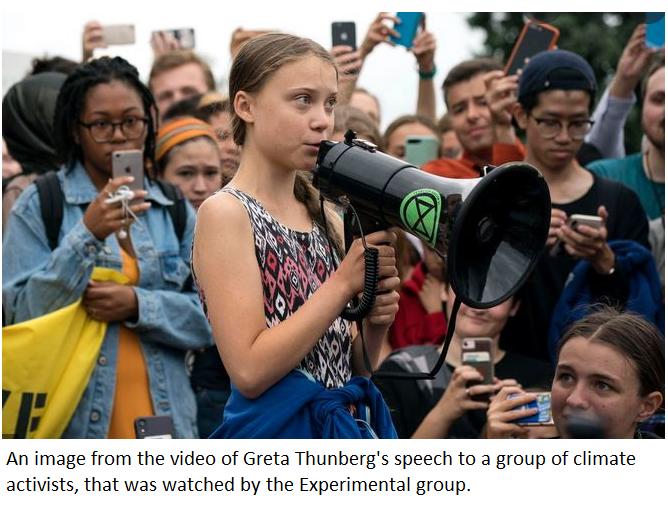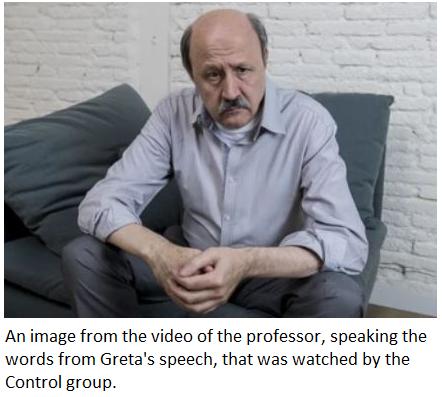Question
Analyze the claims being made in the research description according to two of the six principles of scientific thinking. Select the most relevant principles, but
Analyze the claims being made in the research description according to two of the six principles of scientific thinking. Select the most relevant principles, but in every case try to find the principles that the research description fails to follow. First define the general principle, then provide a detailed response showing how the research description specifically fails to follow the principle. Finally, try to say what would need to be done to make sure the research description follows the principle.
Principle 1: Ruling out alternative explanations - Usually the results of any single study are consistent with several different explanations (or hypotheses) and additional research is often needed to decide which explanation/hypothesis is best supported. When looking at a pattern of results that has been reported from a study, it is important to ask "are there any alternative hypotheses that could explain this pattern of data?" That is, we should consider whether there are any other reasons why the researchers might have found the particular results that they found in their study. Maybe there was a confounding variable in an experiment that could offer a different explanation for the results, other than the one that the researchers have given. The alternative explanations that are most important to acknowledge are those that could explain the specific pattern of results that has been found in the study. It is useful to consider how we could attempt to rule out these alternative hypotheses.
Principle 2: Correlation vs. causation - A correlation between two things (a statistical association) does not necessarily mean there is a cause-and-effect relationship between them. If a pattern of results was produced simply by measuring two different things and comparing them, we cannot say anything for sure about whether one of these things caused the other; all we can say is that the two things go together. When a causal claim (e.g., A causes B) is made from a correlation, it's always important to ask whether the causal connection could be reversed (i.e., B causes A) or whether a third variable could explain the relationship (i.e., A and B do not cause each other; instead C causes A and B to go together). If there is more than one possible pattern of cause-and-effect that could result in a correlation, we cannot use that correlation as evidence that any one specific pattern of cause-and-effect is necessarily true.
Principle 3: Falsifiability - Scientific claims must be capable of being disproved. In other words, we should be able to think of a way to test whether or not a claim is true; there should be data we can collect that tell us if our hypothesis is likely to be true or false. If the claim is made in such a way that there's no good way to test it, the claim is not really scientific. In science, we should always be open to the possibility that our ideas are wrong. If there are no data that could convince us that our ideas are wrong, then our ideas are not properly scientific.
Principle 4: Replicability - Scientific findings must be capable of being duplicated following the same methodology that the original researchers used. In other words, in science, other people must be able to follow our methods and should get similar results. In addition, the most reliable claims are those that have converging evidence for them. We can only really be confident in a claim if it has been tested in multiple different ways and all of them point to the same effect.
Principle 5: Extraordinary claims - Science is, for the most part, a cumulative process, where new claims represent small advances over older ones. A claim that contradicts what we already know, or that seems to promise to completely explain or solve a complex problem in a new way, must have a lot of evidence to back it up. The bigger the claim, the more evidence must be provided. If a researcher is making really big or really strong claims, then they will need to have provided a lot of evidence, or some really convincing evidence, for those claims.
Principle 6: Parsimony (a.k.a. Occam's razor) - If two hypotheses explain a phenomenon equally well, in science we generally prefer the simpler explanation. The simpler explanation is not necessarily correct, but we should start by using that explanation and only make a more complicated one when the simple explanation cannot account for our results. In other words, we shouldn't make our explanations more complicated than necessary.
RESEARCH DESCRIPTION
The Greta Thunberg Effect!
By Clive Matthews
"No One is Too Small to Make a Difference" is the title of student and climate activist Greta Thunberg's book. And now it seems that recent science has found that Greta was right! In what researchers are calling The Greta Thunberg Effect three new studies from psychologists at the University of Guelph have shown that Greta herself has made a huge difference in creating awareness of, and promoting action about, climate change!
Psychologists who study how people make and change their attitudes have long known that we are often persuaded to change our minds by people who are similar to us, as well as by well-known and high-profile individuals. However, these are the first studies to show that Greta herself has heavily influenced people's attitudes about climate change.
In their first study, the researchers showed that Canadians who were more familiar with Greta were also more concerned about climate change and had taken more actions to try to combat it. In this study, the researchers contacted a nationally-representative sample of 3 000 Canadians aged between 12 and 100. The researchers then asked them "how much do you know about Greta Thunberg?" and asked them to answer on a scale from 1 ("I know very little or nothing about Greta"), 2 ("I know a reasonable amount about Greta") to 3 ("I know a lot about Greta"). The same people were also given a standardized questionnaire that asked several questions about how concerned they were about climate change and what actions (including giving up meat, giving up flying, attending protests, and so on) people had taken to try to mitigate climate change.
When the researchers looked at the relationship between these measures, the results were clear. The people who knew most about Greta were also the people who were most concerned about climate change and who had taken the most actions to try to combat it. So, learning about Greta's actions and hearing about her protests clearly caused these people to become more concerned about climate change and more inspired to do things to stop it!
In a second study, the same researchers conducted an experiment. This time they recruited a sample of 1 000 young adult Canadians and randomly-assigned half of them to watch a video of a speech on climate action, given by Greta, to activists at a climate rally in Washington, D.C. As a control group, the other half of the participants watched a video of a professor in his office at The University of Guelph, reading out loud from a transcript of the exact same speech that Greta gave. The researchers gave the same speech to the two groups because they wanted to see if there was something unique about Greta that makes her more persuasive than anyone else.


The results of this second study showed that the people who watched Greta give the speech were more persuaded that climate change was an urgent problem (they were more likely to agree with statements such as "If things continue on their present course, we will soon experience a major ecological catastrophe"), but also more likely to believe that they could do something to help tackle climate change (agreeing more with statements such as "I think that I myself can contribute to the improvement of the climate change situation"), than people who watched the same speech given by the professor. This clearly shows that Greta has something unique that motivates people to take climate change seriously and to take climate action; her exact words spoken by anyone else are just not as persuasive! In fact, the researchers believe they might know why Greta is more persuasive than anyone else - "It's a special quality of her voice", the researchers argued, "her voice has a rare mixture of high and low frequency sounds in it, which draw our attention and make us listen to what she is saying."
In their final study, the researchers went to a conference on climate change that was attended by participants from all around the world. They wanted to show that it's not just climate activists in Canada who have been inspired by Greta. The researchers approached 300 people at the conference at random and asked each person "have you heard of the prominent climate activist, Greta Thunberg?" Of those surveyed, 98% said they had, showing that Greta has inspired climate activists from all over the world!
An image from the video of Greta Thunberg's speech to a group of climate activists, that was watched by the Experimental group.
Step by Step Solution
There are 3 Steps involved in it
Step: 1

Get Instant Access to Expert-Tailored Solutions
See step-by-step solutions with expert insights and AI powered tools for academic success
Step: 2

Step: 3

Ace Your Homework with AI
Get the answers you need in no time with our AI-driven, step-by-step assistance
Get Started


